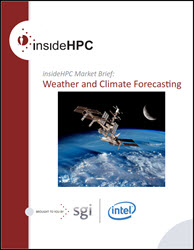
Erland Källén, ECMWF
In this video from EASC2016 in Stockholm, Erland Källén from ECMWF presents: Weather Prediction and the Scalability Challenge.
“Weather prediction using high performance computing relies on having physically based models of the atmosphere that can deliver forecasts well in advance of the weather actually happening. Numerical weather prediction (NWP) is an initial value problem where globally distributed observations, coming from satellites as well as the Earth’s surface and in-situ atmospheric observations, are continuously processed to define starting points for weather forecasts. Typically tens of millions of observed quantities have to be processed in real time within an hour. A forecast model is then integrated forwards in time out to two weeks ahead, also within an hour. The forecast information is subsequently distributed to users all over the world. A European intergovernmental organization, ECMWF (European Centre for Medium range Weather Forecasts), was established forty years ago to deliver global forecast information to its member states. The forecasts have a very high quality, regular assessments conducted by the World Meteorological Organization show that the forecasts from ECMWF are generally better than the ones produced by other weather centers around the world. ECMWF uses HPC in order to be able to deliver the forecasts and to continuously improve the forecast quality. One of the main challenges today is to use software that can run efficiently on an HPC with hundreds of thousands of processors. Both the forecast model and the processes used for assimilating observations and distributing the forecast outputs have to be made much more efficient than they are today. Therefore ECMWF has embarked on a scalability program together with the NWP and climate modeling community in Europe. The program is supported by a number of EU funded research projects as well as national and intergovernmental resources. Particular research topics are numerical algorithms, big data storage and distribution and improved parallelization of software used in all stages of the forecasting system. The talk will give an overview of the principles underlying numerical weather prediction as well as a description of the HPC related challenges that are facing the NWP and climate modeling communities today.”
Erland Källén obtained his PhD in meteorology from Stockholm University in 1980 and since 2009 he works at ECMWF (European Centre for Medium range Weather Forecasting, Reading, UK) as Director of Research. From 1983 until 2009 he was first an associate professor and later professor in dynamic meteorology at Stockholm University. His areas of research are large scale dynamics of the atmosphere, numerical weather prediction and climate modeling. He has worked as a project leader for the European regional weather forecasting project HIRLAM and was responsible for initiating and heading the first Swedish climate modeling program in the 1990’s. As a leader of these projects he worked for the Swedish Meteorological and Hydrological Institute (SMHI) in Norrköping, Sweden. He also spent one year as Head of Research at the Danish Meteorological Institute (DMI) in Copenhagen, Denmark. During the period 2000-2006 he was Head of the Meteorology department at Stockholm University. Erland Källén is a member of the Royal Swedish Academy of Engineering Sciences and Academia Europea.




